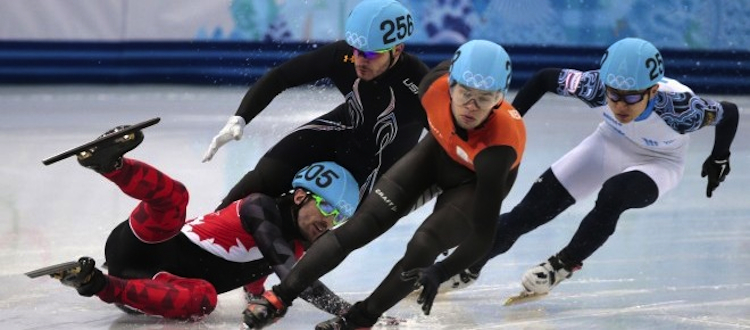Record-setting gold eludes Hamelin
Short-track powerhouse makes no excuses after soft ice Sochi crumbles under his skate, sending him sprawling
Ivan Sekretarev/AP
Share

We ask them to explain, and no matter how carefully the unsuccessful athletes choose their words—in French or English—they sound like they’re trying to shift the blame. So you’re going to have to trust me when I tell you that Charles Hamelin doesn’t do excuses.
When he says the ice was soft, shattering under his right skate blade, he’s not accusing some hapless Zamboni driver, or the capricious gods of men’s short-track speedskating. The ice at the Iceberg Skating Palace was soft, because spring has arrived in Sochi with such ardor that we should all be throwing finger quotes around the phrase “Winter” Games.
No, Hamelin went down fair and square in a 1000m semifinal, wiping out an American skater named Eduardo Alvarez and piling into the bouncy-castle pads that line the boards in this crash-prone sport. In doing so, he missed a date with destiny to set the Canadian record for most golds by a Winter Olympian—four—though the possibility remains he’ll pull it off in the 500m. And as lost opportunities go, this was significant: the 1,000m is Hamelin’s best event.
To his everlasting credit, the 29-year-old from Levis, Que. pointed out that the ice was the same for everyone—an obvious yet oft-forgotten point when track conditions have come into question during the Sochi Olympics.
“Sometimes in short track, you have days that are rude for people,” Hamelin shrugged. “Today was a rude day for many people, not just for me but for other countries and other guys. The ice was a factor, and they fell. But we have to live with it and make sure that we come back strong in the next few days.”
Hard to believe Hamelin won’t do just that when the 500m goes next Friday, given his impressive showing in the first third of the 1,500m, in which he won gold.
Yet Saturday’s crash came early in the race, serving as a reminder of the first rule of his sport: stay on your feet. We’ve become used to Hamelin skating cleanly in large measure because he gets out in front and stays there, thus avoiding chain-reaction collisions. Yet no one in the demolition derby that is short track can claim to be perfect. Hamelin certainly doesn’t.
This time, though, he was the first link to break, and no one was more shocked than Alvarez, whose leg plowed into Hamelin’s arm as the Canadian fell to the ice. “He’s a great skater,” said Alvarez. “You almost never see him go down like that.”
Indeed, the wipeout typified a recent luckless streak in short-track for Canada, which is referred to as one of the “Big Four” countries in the sport, along with China, Korea and the U.S. On Thursday, in the always-zany 5000m men’s relay, Hamelin’s younger brother Francois stepped on a track marker during a semifinal and went down. Then, on Saturday, the Canadian women came up dry in the 1500m: none of the three who qualified for the Games made the final.
The mishaps have put paid to widespread predictions that Canada could come away with three or even four medals in short track, and it’s running out of events. The women’s 3000m relay goes Tuesday, but if Saturday’s results are anything to go by, Team Canada’s women are not in top form. And while Hamelin is defending Olympic champion in 500m, he’ll face heavy competition from world no. 1-ranked Victor An, a transplanted Korean who moved to Russia after he failed to qualify for his country’s team for the 2010 Games in Vancouver.
An went on to win the 1000m after Hamelin stumbled, capping a euphoric day for the host country, which also took silver (Vladimir Grigorev).
If this keeps up, they’ll have to start calling it the Big Five.